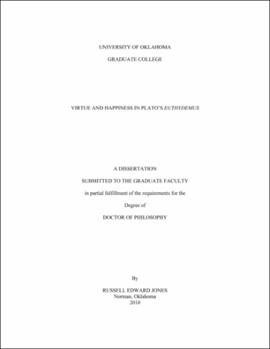| dc.description.abstract | There is perhaps no philosophical thesis that has more often been thought to be most central to or most distinctive of the philosophy of Socrates in Plato's dialogues than the thesis that virtue is sufficient for happiness. In this dissertation, I interpret the Euthydemus with an eye toward what it reveals about Socrates' views about the relationship between virtue and happiness. In chapter 1, I survey the state of scholarship on virtue and happiness. In chapter 2, I narrow my focus to the Euthydemus and offer a framework in which to place the passages I analyze in the following chapters. In chapter 3, I offer a close reading of Euthydemus 277-282, arguing that it supports attributing to Socrates the view that virtue is necessary for happiness, but not the view that virtue is sufficient for happiness. In chapter 4, I offer a close reading of Euthydemus 288-292, arguing both that it confirms the findings of chapter 3 and that Socrates conceives of virtue as a craft. In chapter 5, I consider how my interpretation of the Euthydemus might be applied to related issues in the Platonic corpus. In particular, I argue that Socrates, by his own lights, was neither virtuous nor happy. | |
